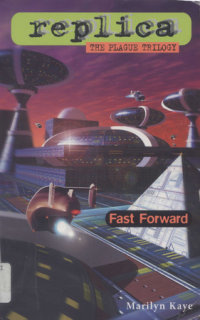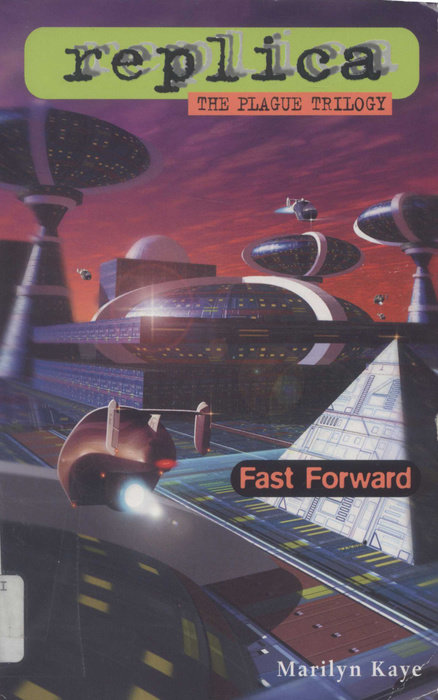one
Mom, listen to this.” Amy Candler read aloud from the science section of a news magazine. “ ‘The world breathed a sigh of relief this past week,’ ” she began. “ ‘According to the International Health Association, the dreaded disease that has come to be known as the Plague no longer presents a threat to the human population. With the identification of the gene that caused the serious disorder, medical researchers have produced an antidote and a vaccine, which are now widely available.’ ”
“Amy, stop reading and drink your orange juice,” Nancy Candler said. “It’s almost time to leave for school.”
Amy obliged with a quick gulp, but she immediately went back to the article and continued reading out loud. “ ‘The isolation of the mutant gene was accomplished by a team of scientists at a Los Angeles hos-pital. While the team insists that this was a group effort, Nancy Candler and Dr. David Hopkins have been noted as the chief instigators of the project. However, when contacted, both scientists insisted that the discovery of the…
one
Mom, listen to this.” Amy Candler read aloud from the science section of a news magazine. “ ‘The world breathed a sigh of relief this past week,’ ” she began. “ ‘According to the International Health Association, the dreaded disease that has come to be known as the Plague no longer presents a threat to the human population. With the identification of the gene that caused the serious disorder, medical researchers have produced an antidote and a vaccine, which are now widely available.’ ”
“Amy, stop reading and drink your orange juice,” Nancy Candler said. “It’s almost time to leave for school.”
Amy obliged with a quick gulp, but she immediately went back to the article and continued reading out loud. “ ‘The isolation of the mutant gene was accomplished by a team of scientists at a Los Angeles hos-pital. While the team insists that this was a group effort, Nancy Candler and Dr. David Hopkins have been noted as the chief instigators of the project. However, when contacted, both scientists insisted that the discovery of the gene was a lucky accident.’ ” Amy looked up. “Mom, why do you have to be so modest about this?”
“Because I’m not interested in fame and fortune,” her mother replied. Then she amended her statement. “Well, a little fortune wouldn’t be so bad. But I don’t want my picture on the cover of Time. That wouldn’t do this family any good.”
“But you could win the Nobel Prize for medicine,” Amy protested. “You’d get a free trip to Sweden to pick up your award and shake hands with the king. I think you get some money, too.”
“I don’t deserve the Nobel Prize,” Nancy said. “And neither does Dave Hopkins.” She gazed warmly at her daughter, and the pride in her eyes was clear. “All Dave and I did was study the gene. You were the one who discovered it.”
Amy sighed. “Well, I can’t take the credit.”
“No, you certainly can’t,” her mother said. “Even though you deserve it.”
The mere thought of her adventure brought a grin to Amy’s face. “No one would believe me anyway.”
Nancy had to agree with that comment. “No, I can’t see Time magazine reporting on how you were miniaturized and injected into Tasha’s genome.”
Amy struck a dramatic pose and pretended to read from an actual article. “This phenomenally courageous fourteen-year-old girl roamed from chromosome to chromosome, confronting hostile genes, storming the mysterious DNA, determined to uncover the nasty mutation from the Stone Age and save the world from total disaster!”
Nancy laughed at her daughter’s theatrics. “Unfortunately, I don’t think there’s a Nobel Prize category for that. Amy, are you ready for school? Tasha’s going to be here any minute.”
“I’m just about ready,” Amy assured her. She didn’t get up to gather her things, though. It was so nice to be able to sit and laugh with her mother. She had recently gained a new appreciation for these moments together. It came from having almost lost her mother to the Plague too.
Was it really just weeks ago that Amy had gone back in time to the Stone Age, seeking the origin of the disease? She’d found the source: Alien visitors to Earth had carried bacteria that infected early inhabitants. And she’d brought back alien blood, enough to create an antidote for her mother. But to save Tasha and everyone else, she had had to enter Tasha’s body to locate the mutated gene, which had lain dormant for millions of years before being mysteriously reactivated.
The latter was an experience she didn’t want to repeat. It had been way weird and scary, not to mention uncomfortable. But it had paid off. The Plague was eradicated, and Amy could get back to her normal life. Well, as normal a life as she’d ever had, considering the fact that she wasn’t like other people.
The phone rang, and Nancy picked up the receiver. “Hello? Yes, this is Nancy Candler.” As Amy watched, her mother’s face took on an exasperated expression. “No, no comment. I’m sorry, I’m not doing any interviews. No, Dr. Hopkins isn’t interested in giving interviews, either. Goodbye.” She hung up.
Amy didn’t have to ask who it was. She’d heard her mother recite those lines again and again. Practically every newspaper and television news program had called her, and more than once. “Gee, those guys don’t give up, do they?”
“I’ve changed our phone number twice already,” Nancy grumbled.
“Don’t sweat it, Mom,” Amy advised. “It’ll blow over.”
“That’s easy for you to say. Your life is back to normal. I have to grit my teeth until I turn into old news.”
There was a knock on the front door, and now Amy had to move. “That’s Tasha. See ya, Mom.” Quickly she gathered up a couple of books and threw them in her backpack. “Where’s my sweater . . . ? Okay, okay, I’m coming!” she yelled as the knocking continued.
But when she opened the door, Amy didn’t see Tasha. In fact, for a moment she didn’t see anything at all. Engulfed in an intense explosion of white light, she was completely blinded.
She was too startled to cry out—and by the time she recovered, her vision had returned. She made out two figures on the doorstep.
“Universal News,” a man said by way of identification. “We have a few questions.”
“Look this way,” ordered a woman with a camera. By now, Amy’s mother had become aware of the commotion and was standing behind her. “What’s going on here?” she demanded. “I’m not giving any interviews, and I would appreciate it if you wouldn’t bother my daughter.”
“We’re not here to interview you, Ms. Candler,” the reporter said. “We want to know more about your daughter. Your so-called daughter.”
Nancy Candler went pale. “What are you talking about?”
The reporter focused on Amy. “Tell us, young lady. How does it feel to be an artificial half-human alien android? And what about the rumors? Are they true? Can you read minds? Can you fly?”
Amy couldn’t speak. Luckily, her mother had no problem finding her voice. “Get off my property! Now!”
Next door, Tasha had come outside and was gaping at the scene. Mrs. Morgan appeared behind her, and she, too, looked shocked. “Nancy, what’s going on?” she called out.
“You can’t keep her a secret, Ms. Candler,” the reporter yelled. “The people deserve the truth!”
“If you don’t leave right this second, I’m calling the police!” Nancy cried angrily.
Mrs. Morgan called from her front step. “Amy, come here. I’m going to drive you and Tasha to school.”

